Nursing is one of the most respected and rewarding careers in the UK. The UK offers structured and accessible pathways into NHS, supported by world-class education, robust healthcare systems, and the opportunity to make a difference in people’s lives every day. In 2025, the number of students accepted into UK nursing programs is estimated to be around 17,630. That just demonstrates the high demand for a nurse.
However, becoming a nurse, especially in the UK, is not as easy as it seems. The good thing is that we, the nursing experts, are there to help.
So, whether you are a school leaver exploring your options, a career changer, or an international nurse looking to join the NHS, this guide is your one-stop resource.
Here, from the NMC registration process, CBT and OSCE exams, to how to land an NHS role, we’ll discuss everything.
Let’s walk through the nursing career pathway for UK students.
How to Become a Nurse in the UK?
Here comes the most asked question: How to Become a Nurse NHS in the UK. To achieve this, you need to select the right degree route, such as a BSN equivalent, meet the entry requirements, graduate from a reputable nursing school with good grades, and complete relevant apprenticeships.
Nonetheless, we know this may be a lot to take in for you. But don’t fret as we uncover everything from what degree you should choose to how to meet the entry requirements below.
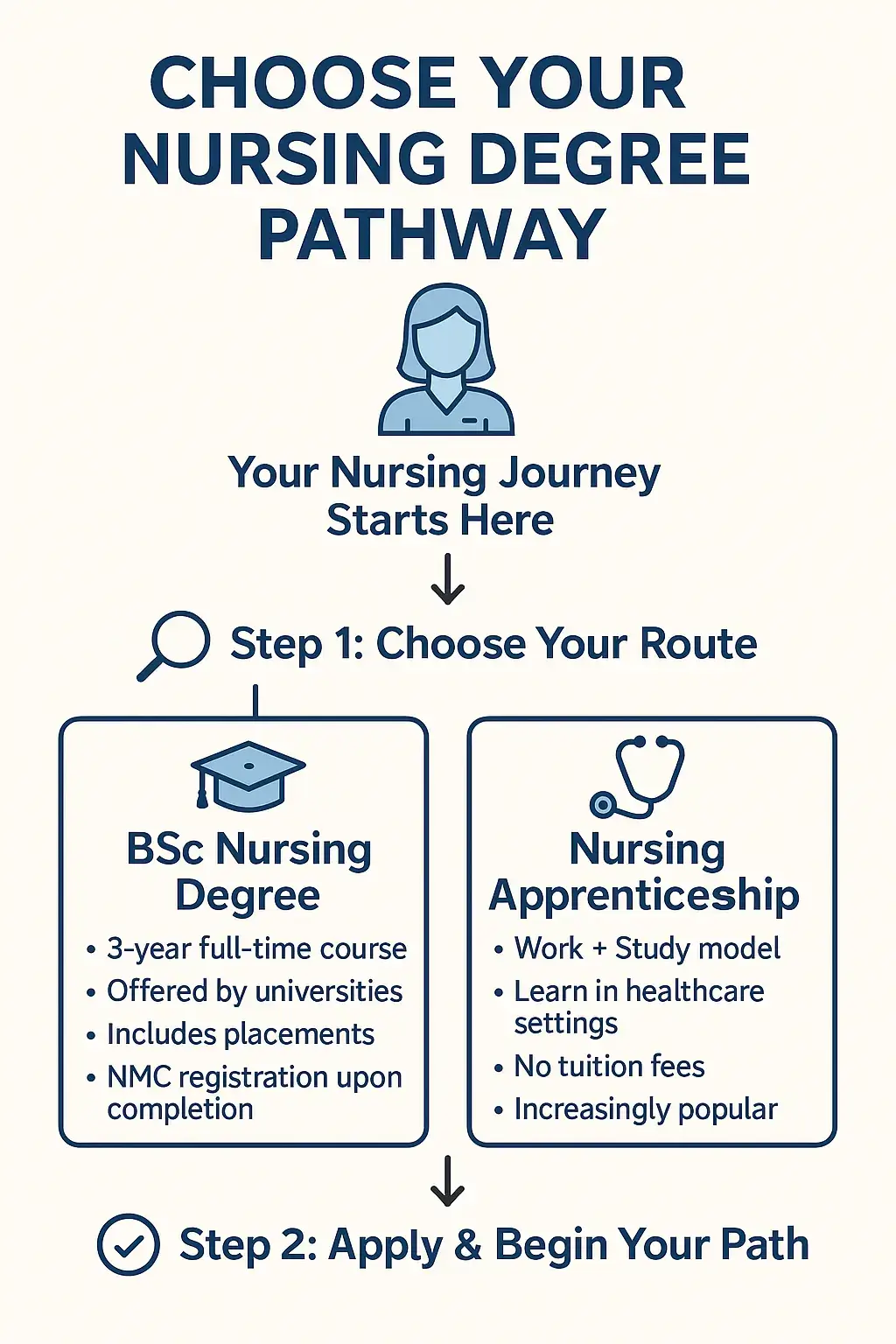
Choose Your Nursing Degree Pathway
If you are considering a career as a nurse in the UK, it is essential to understand the degree routes available. To put it simply, there are two different ways:
- Nursing Degree (BScNursing): It is the most common and direct route. Offered by many nursing institutes across the UK, it is typically a 3-year full-time course with practical placements. Moreover, it leads to registration with the Nursing and Midwifery Council. (NMC).
- Nursing Apprenticeships UK: This is more like a hands-on option while you learn theory. Furthermore, you can work in healthcare settings while studying for the nursing qualifications. Nowadays, apprenticeships are becoming more popular as people want flexibility while avoiding tuition fees.
Each one is designed to meet your needs and goals. So, the first step towards becoming a nurse is to choose what nursing education in the UK you want to go for. Take your time, explore the options, and then select the best pathway.
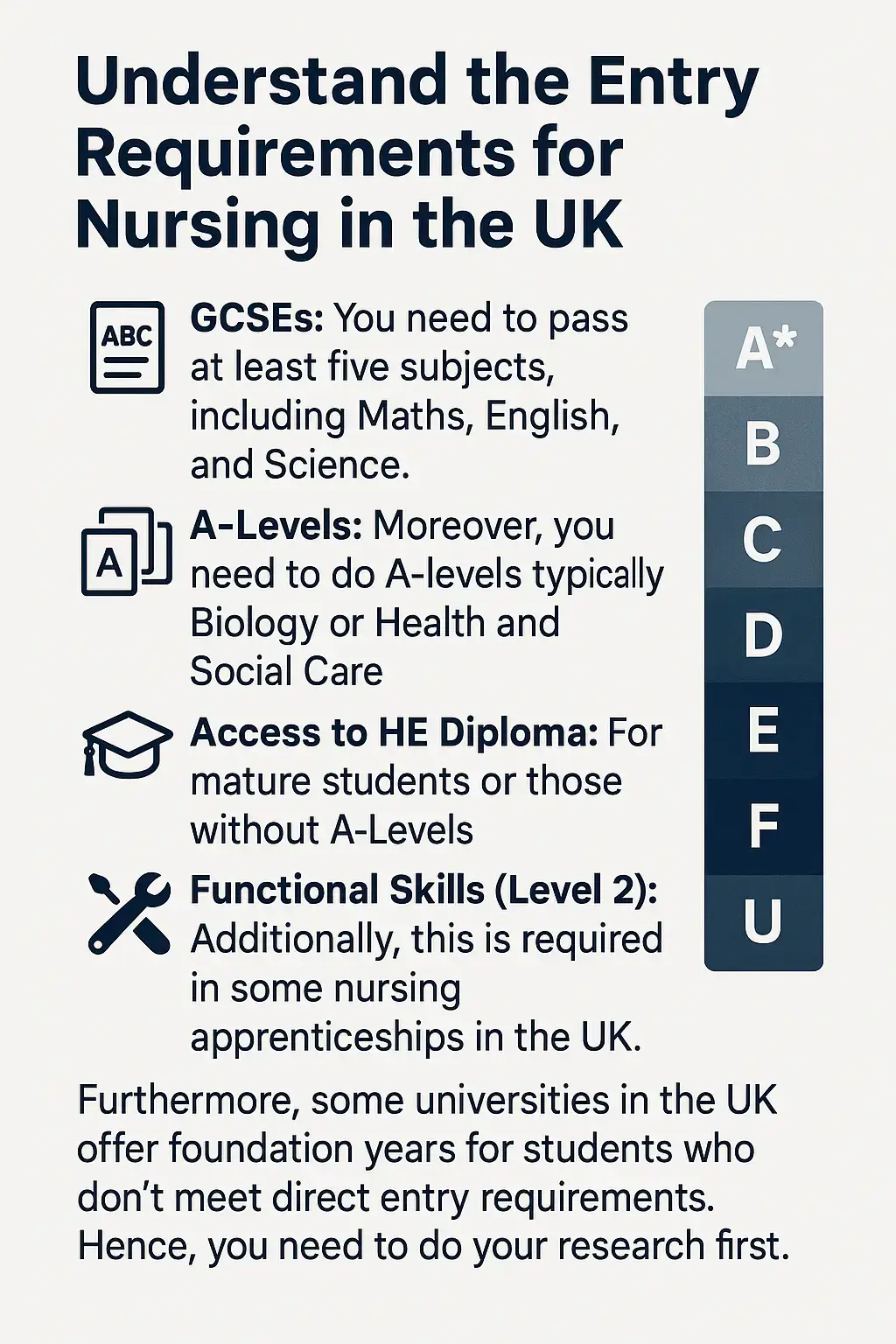
Understand the Entry Requirements for Nursing in the UK
Whether you are applying for a degree or an apprenticeship, there are specific entry requirements for nursing in the UK that you need to pass. They include:
GCSEs: You need to pass at least five subjects, including Maths, English, and Science.
A-Levels: Moreover, you need to do A-levels typically Biology or Health and Social Care
Access to HE Diploma: For mature students or those without A-Levels
Functional Skills (Level 2): Additionally, this is required in some nursing apprenticeships in the UK.
Furthermore, some universities in the UK offer foundation years for students who don’t meet direct entry requirements. Hence, you need to do your research first.
Find and Apply to the Universities in the UK
Now that you know what degree you are going for and have learned about the entry requirements, it is time for you to pick a university.
But how to get into nursing school?
Obviously with so many institutes, it is hard to choose which one is a better option for you.
Let’s discover!
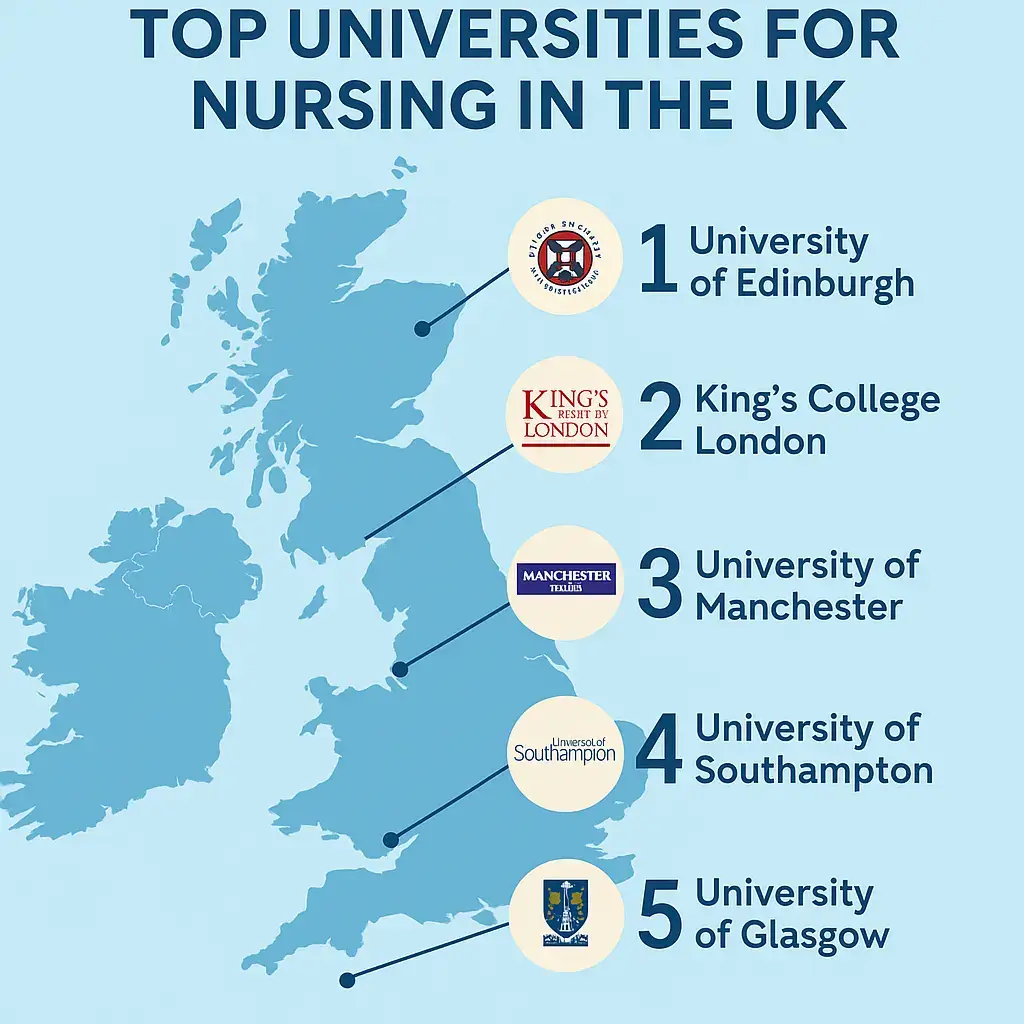
Best Universities for Nursing in the UK
While there are various options available, our top five choices include:
- University of Edinburgh: Renowned for its strong emphasis on research-led teaching and global health in nursing studies. This is the best option and it is recognized globally and is counted as one of the world’s best universities because of its high-quality educational standards and commitment to quality.
- King’s College London: It is the home to one of the UK’s largest faculties. Moreover, it offers cutting-edge learning and clinical placements. It is ranked at 31st at the world’s QS ranking. And is considered as one of the best institutes of the UK.
- University of Manchester: If you are looking for innovative nursing programs that include health research, this is it. This one is the best university in Manchester to look for with world class facilities and top quality research programs. Also, it is considered as one of the best for nursing students.
- The University of Southampton is renowned for its high student satisfaction and excellent learning opportunities. They are offering various nursing programs with different specializations. They are known for their amazing faculty members with years of experience in this field.
- The University of Glasgow is another excellent option. It combines academic excellence with clinical practice across a diverse range of healthcare settings. That is why students from all around the world apply to study here every year.
So, this is all you need to know about how to become a NHS nurse. I am sure that you must be pretty clear by now about what you need to do.
Moreover, if you wish to learn more about these universities, be sure to visit their websites.
How to Choose the Right Nursing University?
Choosing the right nursing university for your studies is really important, as your future depends on it. Therefore, it is better to consider the right factors while choosing the best Nursing College for you. Here is what you need to look for while making this crucial choice:
- Accreditation – You need to make sure that the program you are applying for is accredited by a recognised body. It is really crucial for your eligibility in licensing and for getting any financial aid as well.
- Budget – It is really important and you must never overlook it. Always check the cost of studies and other expenses while applying for nursing colleges, and see if they are within your budget. Make sure that you are choosing a university that falls within your budget. So, do not waste time on applications that do not fall under your budget. But many institutes often offer scholarships and financial aid, too. So, keep your eye on that too.
- Programs Offered – Take out time and see what programs they are offering. If you are willing to enrol in a specialised degree program. Then you first need to check if they are offering it.
- Clinical Experience – Along with your education, getting hands-on clinical experience would be a great opportunity for you to polish your skills. So, try to choose a program that is partnered with a clinic to provide practical experience to nurses as well. Thus, helping you apply your theoretical knowledge in the real world.
- Student Support Services – You must try to look for programs that offer student counselling and support services. It is really important, especially for foreign students.
- Location & Campus Life – The location of your selected nursing college is important, too. If you are not really social and can live in an isolated area, then you can choose a peaceful city for your studies. Also, you need to check the weather of that specific area to see if you can easily survive it. For instance, it’s hard for students from really hot countries to live somewhere really cold.
So, make sure that you are considering these factors while choosing your Nursing institute in the UK.
Nursing Specialisations and Band System
The next step you need to take is to pick out the specific areas of nursing practices and learn about the band system.
Come on! Let’s learn more about it.
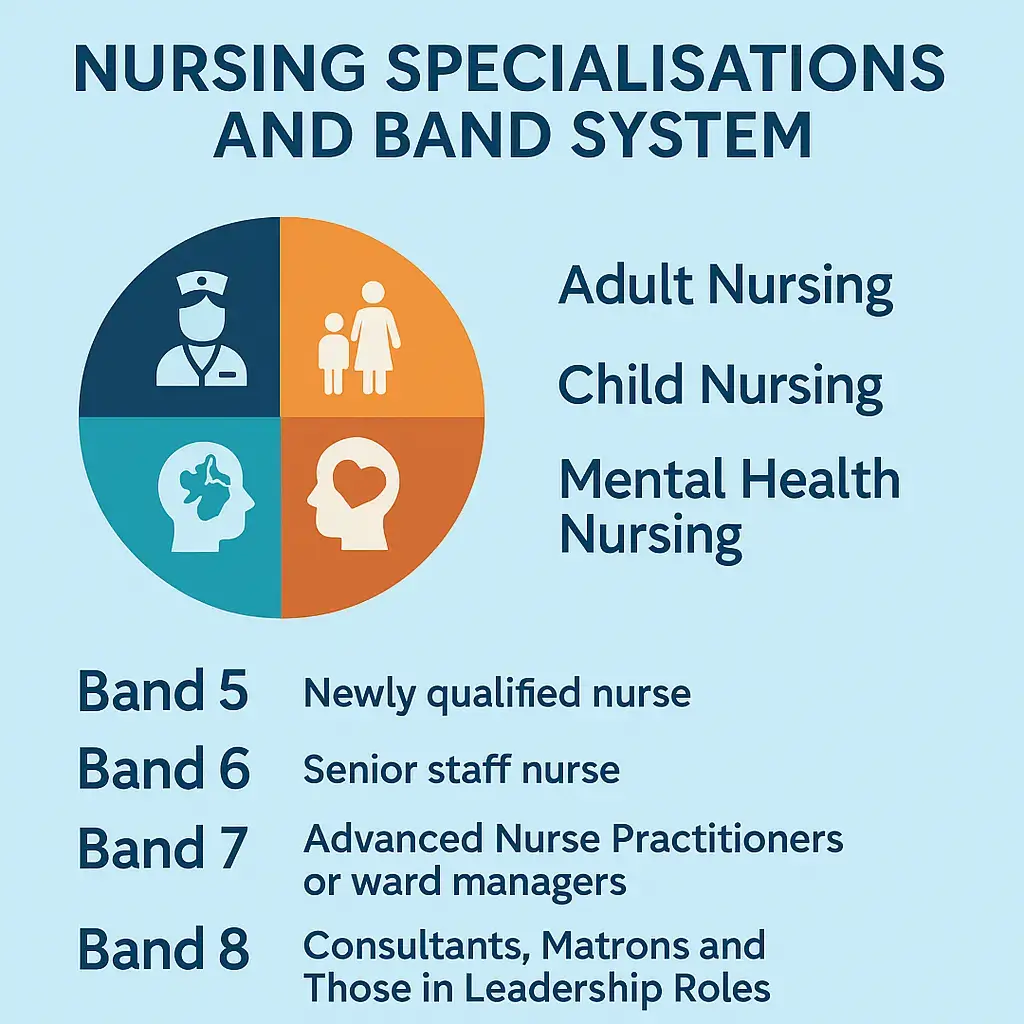
Different Nursing Specialisations
In the UK, while there are different types of nursing specializations, here are the four most popular ones:
- Adult Nursing: Are you someone who enjoys caring for older adults? This is for you, as it involves looking after those above 18 in hospitable and community settings.
- Mental Health Nursing: For those who want to bring a change in society and understand the impact of mental illnesses, this is for you.
- Children’s Nursing: Focused on infants to teenagers, child nursing is quite popular in the UK.
- Learning Disability Nursing: This specialization involves learning how to support individuals who struggle to understand and overcome challenges in their daily lives.
Thus, you need to decide on the specific field in which you want to specialise. Many pupils opt for one particular field, and many institutes allow you to go for dual options. While there are many Nursing Assignment Help services in the UK, studying can sometimes take a toll on your mental health. Therefore, determine your goals and choose wisely, as nursing can be challenging due to the need to balance clinical placements, assignments, and other responsibilities.
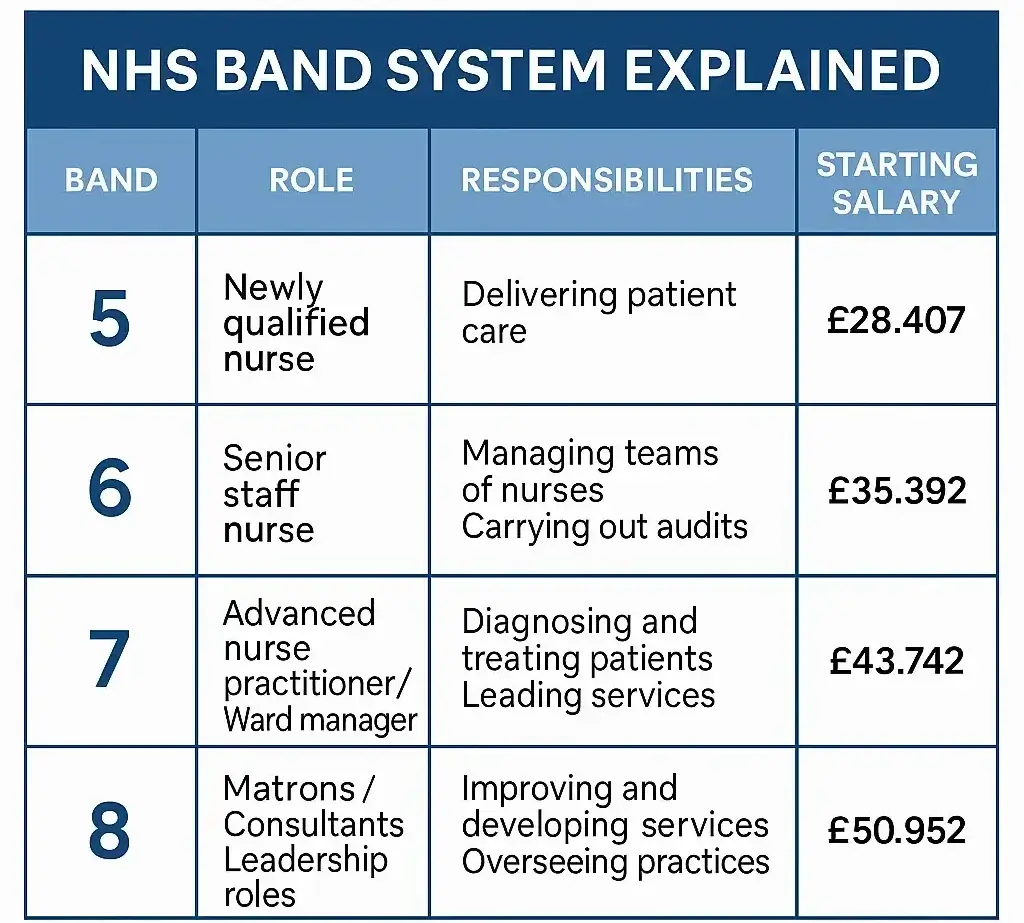
NHS Band system explained
Remember, we talked about the NHS band systems?
Well, the NHS band system divides the nurse community based on their experiences, responsibility, and pay. Furthermore, it basically starts from band five and goes up to band 8. Here is the complete breakdown of the NHS bands.
- Band 5: This is for the newly qualified nurse.
- Band 6: Senior staff nurse
- Band 7: Advanced Nurse Practitioners or ward managers.
- Band 8: Consultants, Matrons and Those in Leadership Roles
Moreover, for those wondering about the pay scale, according to the NHS Nurse Salary 2025, it is around
£28,000 for Band 5 and can exceed £50,000 to £70,000 in Band 8. Hence, by understanding the difference between Band 5 and Band 6, you can set career goals early.
International Nurses: NMC Registration Guide
Are you an international nurse who was trained outside the UK and now needs to apply there? Well, then you need to register with the Nursing and Midwifery Council before working in the NHS. Furthermore, there are four things you need to know about:
- Eligibility and Documents
- English Language Test
- CBT
- OSCE
Come on! Let’s have a look at each of them in detail:
Eligibility and Documents
First things first, to begin with the NMC registration process, you’ll need:
- Valid Passport
- Nursing qualification certificate
- Additionally, a proof of professional registration in your country
- Employment reference
- Police clearance certificate.
NMC English Language Requirements
Since English is the primary language in the UK, when applying for a nursing position there, you must demonstrate English proficiency through the IELTS for NMC and OET for Nurses UK. That’s not it! You need to have a desired score like:
- IELTS for NMC: You need to score 7.0 in reading, listening, speaking, and 6.5 in writing.
- OET: Moreover, get Grade B in all sub-tests.
Furthermore, qualifications from the majority of English-speaking countries may be accepted. So, check that out too.
CBT For Nurses in the UK
The CBT, or computer-based test to become a nurse in the UK, is administered by NMC. It is a mandatory assessment for the nurse trained outside the European Economic Area (EEA) seeking registration in the UK.
The main purpose of the test is to evaluate nurses’ theoretical knowledge and understanding of professional standards. Thus, this ensures they can meet the UK healthcare requirements.
Moreover, the CBT is a crucial step in the registration process, allowing a nurse to show their competency and qualify for practice in the UK.
Resources:
OSCE for Nurses in the UK
Another thing you need to do is give an OSCE.
Well, what is it?
It is the Objective Structured Clinical Examination, which tests practical skills at designated UK test centres. For this, you will need to go through stations that simulate clinical scenarios. The OSCE pass rate in the UK improves with preparation.
You’ll rotate through stations simulating clinical scenarios. Moreover, the OSCE pass rate in the UK improves with preparation.
We’ll learn more about this later on.
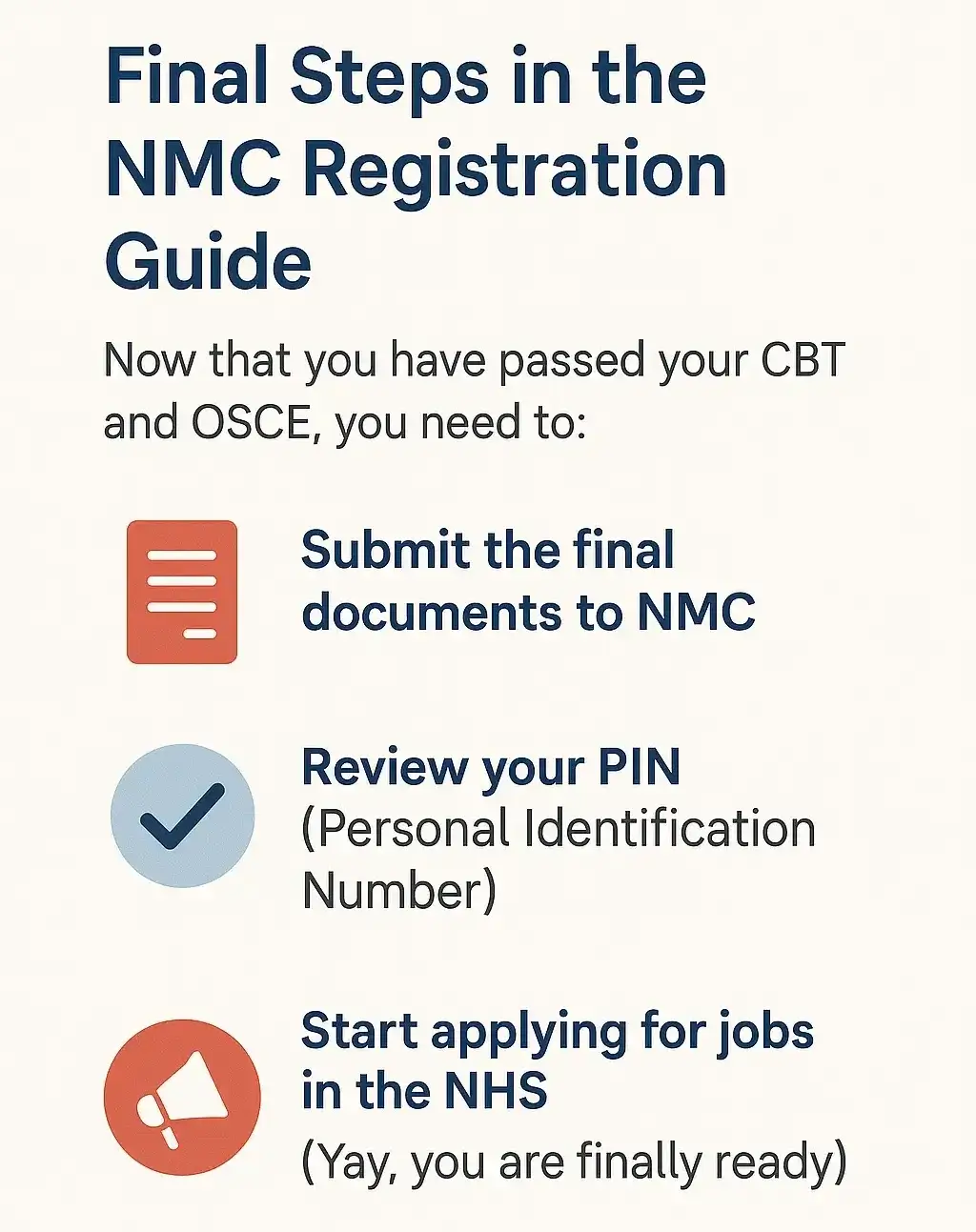
Final Steps in the NMC Registration Guide
Now that you have passed your CBT and OSCE, you need to:
- Submit the final documents to NMC
- Review your PIN (Personal Identification Number)
- Start applying for jobs in the NHS (Yay, you are finally ready)
Preparing for CBT and OSCE Exams
Whether you are preparing for CBT or OSCE exams, it can be challenging. In fact, you need to prepare for them.
Here’s what you need to know.
CBT Exam for Nurses
The CBT, as you already know, tests your theoretical knowledge of the UK nursing practice.
- Duration 3 hours
- Multiple choice questions.
- Topics most include adult nursing, mental health, infection control, and ethics.
The structure of the CBT includes:
- Part A: It focuses on numerical skills relevant to nursing practice, with 15 questions to be completed in 30 minutes.
- Part B: It assesses the clinical knowledge and application, consisting of 100 multiple-choice questions to be completed in 2 hours and 30 minutes.
To prepare for the NMC CBT test, practice questions are available online. Hence, you can look them up.
How to prepare?
To prepare for your CBT test, you should:
- Practice tests online
- Review NMC’s blueprints
- Join CBT study groups
- Use mobile apps and flashcards.
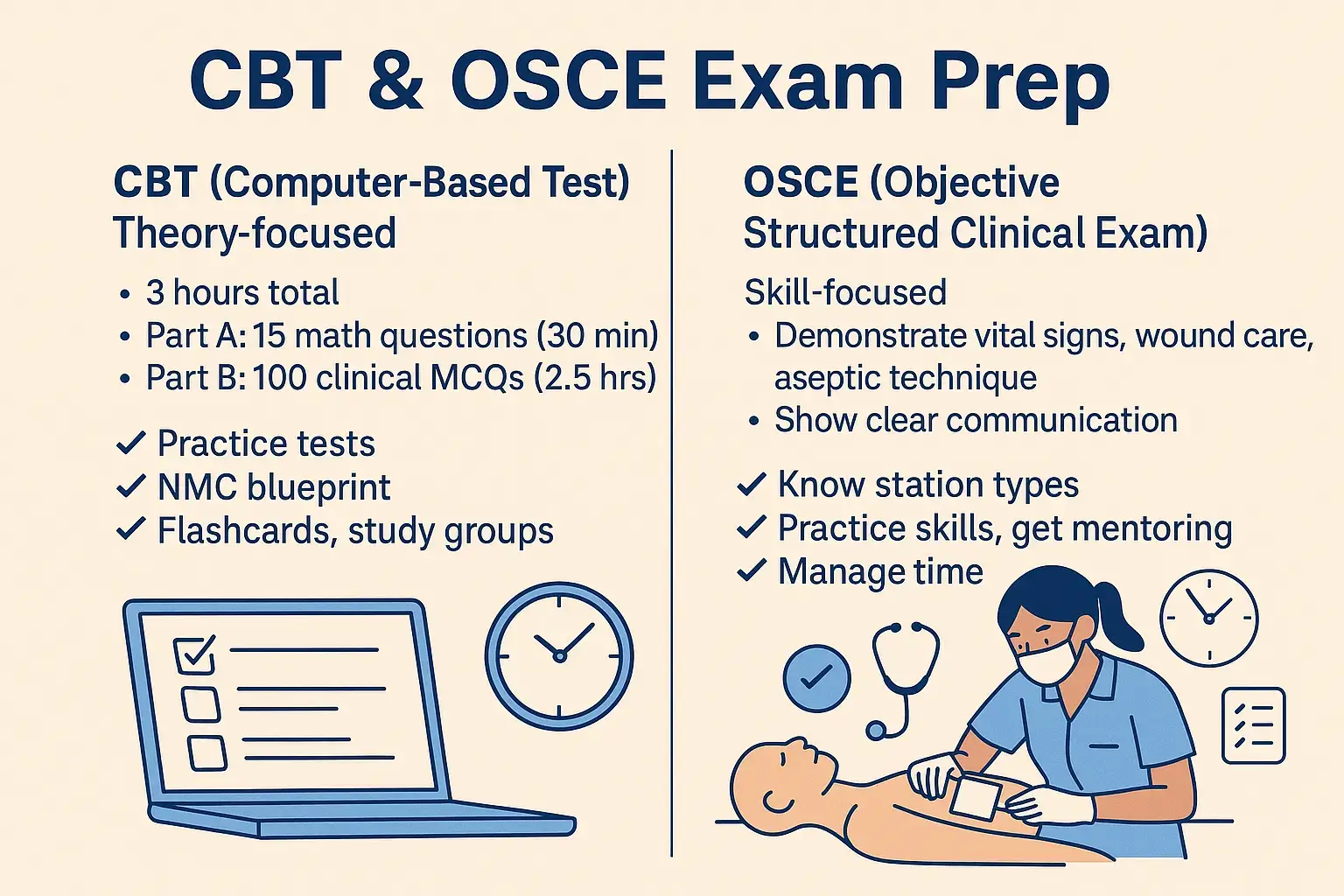
What is the OSCE?
As we covered, the OSCE assesses real-life clinical scenarios. Here you will have to show:
- Vital signs monitoring
- Aseptic technique
- Wound dressing
- Communication skills.
OSCE Exam Preparation UK Tips:
Here are the tips for preparing for the OSCE.
- Ensure you understand the format and types of stations.
- Moreover, practice the required skills and seek help from your mentor.
- Additionally, review the relevant knowledge to gain a deeper understanding.
- Lastly, learn how to manage your time effectively. Also, if you are having a tough time preparing for the OSCE, consider seeking guidance from the professionals at Nursing Essay Help services. They have nurses who have gone through the exact process, and they can assist you with the queries.

Getting a Nursing Job in the NHS
Now that you’ve completed your nursing degree, it is finally time for you to start looking for a nursing job in the NHS. Here is what you can do:
Applying Through NHS Jobs
You should start by applying through NHS Jobs. The NHS Jobs portal is your gateway to getting the desired job. While searching for filter roles by:
- Location
- Band
- Field
Moreover, consider using keywords like Band 5 Overseas Nurse or Newly Qualified Nurse NHS.
Prepare for the NHS Interview
Now you need to start preparing for the NHS interview.
The question is: What do they include?
They are:
- Why do you want to work in the NHS?
- How would you handle a challenging patient?
- Describe a time you worked under pressure.
- Scenario-based questions, such as medication errors.
To prepare for the interview, there are many websites that help you prepare. Moreover, if you are still worried, don’t be! Below are some tips to help you succeed.
Tips for Passing the Interview
To ace your interview, you should:
- Research the place where you are applying and read their policies.
- Prepare examples using the STAR method.
- Additionally, dress professionally.
- Lastly, don’t forget to ask questions in the end.
Life as a Nursing Student (UK-Based)
Before we end the guide, let’s discover what life as a nursing student looks like:
- Firstly, you should expect to spend 50% of your time on placements in hospitals, mental health care units, communities, etc. Furthermore, you will have to shadow the expert nurse, learn to document care, and gradually take on responsibilities under supervision.
- Also, nursing education in the UK is demanding. You will have to juggle 12-hour shifts, university assignments, group work, and revision for practice exams.
- Moreover, time management and self-care are a must. You should build a support network with peers, speak to your academic advisor when stressed, use student counselling services, and prioritize resting.
Helpful Resources
Useful Links:
Here are some useful links and resources to get you started on your Nursing Career Pathway in the UK:

Frequently Asked Questions
1. Can I work while studying nursing in the UK?
Yes! Many students work part-time as healthcare assistants. Balance is key. While studying nursing in the UK. Just make sure to balance everything properly.
2. Is IELTS hard for NMC?
Yes! IELTS is hard for NMC. However, with focused prep, you can definitely pass it. Additionally, there are plenty of practice resources for IELTS and OET for nurses in the UK.
3. How long does it take to become a nurse in the UK?
For UK students, it takes around 3 years. Moreover, for overseas nurses, it depends on your NMC registration date.
4. Can an international nurse work in the NHS?
Absolutely. Furthermore, over 10000+ overseas nurses apply for the UK nursing programs each year.
5. What’s the difference between CBT and OSCE?
While CBT is a written theory exam, OSCE is a practical test. However, both are crucial for NMC registration.
6. How to prepare for the OSCE exam?
To prepare for the OSCE exam, use the official resources, attend prep sessions, and practice scenarios.
Wrapping Up!
Nursing is more than a career; it’s a calling to help people. With structured education, support for international professionals, and a clear nursing career pathway, there has never been a better time to join this noble profession than now. Furthermore, whether you are starting out or transitioning into healthcare, this guide should give you the confidence to take your next step in becoming a nurse.




 UK Cities
UK Cities